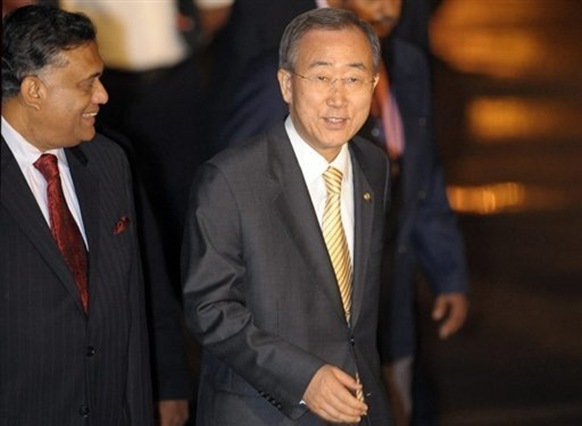
UN Secretary-General Ban Ki-moon came face-to-face Saturday with the despair of Sri Lanka’s war-hit civilians as he toured the nation’s biggest refugee complex, home to 200,000 displaced by fighting.
Just days after Colombo declared victory over Tamil Tiger, he toured the sprawling Menik Farm camp, 250 kilometers (155 miles) north of Colombo, which was jammed with civilians who had fled the war zone.
"I’m very moved after what I have seen. I’ve seen so many wounded," he said after spending 20 minutes walking through the camp, a sea of makeshift corrugated iron shacks and tents.
"There are huge challenges that can only be overcome by strong support from the international community," said Ban, on a 24-hour visit to Sri Lanka.
He stopped at a government-run clinic where he saw around 100 elderly patients, some with gaping wounds, who had been caught up in the conflict.
The camp, referred to by Sri Lankan authorities as a "welfare village," was surrounded by barbed wire and under heavy guard.
Tamil activists have likened "welfare villages" to concentration camps, while UN and aid agencies have complained about restrictions on vehicle access to the shelters.
Asked whether the security was there to stop people leaving, Ban replied: "I don’t think they are holding them (the civilians) back for any particular purpose.
"They’re trying to resettle them, to reintegrate them," he said. "That is the Sri Lanka government’s commitment.
But "there seems to be a clear limitation in their capacity to resettle these people. The UN is going to try to fill the gap."
Ban, due to return to Copehagen late Saturday, said Foreign Minister Rohitha Bogollagama had promised him civilians would be resettled by year end.
He said he would mobilise UN agencies and international non-governmental organisations to help with the resettlement.
The UN chief was expected to press President Mahinda Rajapakse to allow unfettered access for humanitarian aid at a meeting later Saturday in the central city of Kandy.
He was also expected to push for full integration of the Tamil minority as part of "national reconciliation." The Tamils make up 12.6 percent of the 20 million population of the island.
"It is time for Sri Lankans to heal the wounds and unite," he said at the start of his trip.
He added that ensuring humanitarian assistance "to the more than 300,000 displaced, badly in need of food, water and sanitation" was one of his priorities.
Seen from the air, the conflict zone in the northeast was a desolate, cratered area with burnt-out vehicles and charred buildings along with an abandoned tent city.
There were no signs of any people in the zone, off-limits to journalists and almost all aid agencies as the war reached its bloody conclusion, making it impossible to verify conflicting accounts of death tolls and the impact on civilians.
Just hours before Ban arrived in Sri Lanka, Rajapakse dismissed international pressure over alleged rights violations.
"There are some who tried to stop our military campaign by threatening to haul us before war crimes tribunals," he told supporters outside parliament in Colombo.
"I am not afraid. The strength I have is your support."
He was supported by many of Sri Lanka’s Sinhalese majority.
"Our president will tell the UN secretary-general we did the right thing — to finish the war off," said businessman A. Ahangama.
Both sides have been accused of rights violations, with campaign groups alleging indiscriminate army shelling and condemning the Tigers, who had fought for a separate state for decades, for using civilians as a human shield.
The office of the UN High Commissioner for Human Rights, Navi Pillay, has called for a war crimes probe, a call backed by former colonial power Britain.
The Sri Lankan military, who have denied killing civilians, declared victory Monday after overrunning the rebels’ last holdout and killing Liberation Tigers of Tamil Eelam leader Velupillai Prabhakaran.
The pro-rebel website Tamilnet has published claims Prabhakaran was still alive but army chief Sarath Fonseka said security forces had cremated his body.
(For updates you can share with your friends, follow TNN on Facebook and Twitter )
